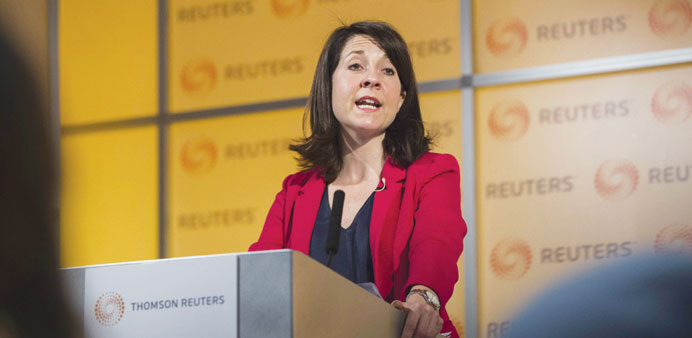Reuters/London
The Labour Party faces a lost decade out of power unless it can convince voters it can run the world’s fifth largest economy properly, Labour leadership candidate Liz Kendall said yesterday.
After Prime Minister David Cameron defeated Labour’s Ed Miliband May 7 election, the opposition party is searching a new leader as it grapples with the reasons for its worst election loss since 1987.
“Any political party that wants to be elected must be trusted with people’s money,” Kendall said in a speech at Reuters in Canary Wharf. “Labour does not have that trust - and this must change.”
Calling for a “renewal of Labour’s tradition of fiscal responsibility”, Kendall said she would pledge to bring debt down as a proportion of gross domestic product and deliver surpluses.
In what amounted to a dissection of the Labour party’s strategy over the past five years, Kendall said Labour faced “10 years at least” out of power unless it won back the trust of voters by recognising their economic aspirations.
When asked if she saw herself as a successor to Tony Blair, prime minister from 1997 to 2007, Kendall, 44, said she preferred to be cast as a ‘Kendallite’ rather than a Blairite.
“I don’t want to be the Labour leader the Tories want: I want to be the Labour leader the Tories fear,” she said.
Four candidates - Andy Burnham, Yvette Cooper, Jeremy Corbyn and Kendall - have secured enough nominations to stand to be the next leader of Labour.
The winner will be decided by a vote of party members, lawmakers and affiliates, including its main financial backers, the trade unions. The result will be announced on September 12.
Kendall, who graduated with a first-class degree in history from Cambridge University, said she had been shocked during the election campaign when she met one long-term Labour voter who was voting Conservative.
“She said to me: ‘The problem is you don’t believe in work.’ And it was a white hot dagger in my heart because we are Labour,” Kendall said.
She pledged to help businesses by crafting “a banking system that supports business investment for the future.”
“We are strong in financial services but the sector should be there to serve the rest of the economy,” she said. “We have too little variety and too little competition in our banking sector.”
Kendall said Cameron’s approach to renegotiating Britain’s relationship with the European Union before a referendum on membership was being dictated to him by Eurosceptic members of his own party.
“He’s been dragged to the right by his backbenchers who will never be satisfied by whatever deal he comes up with,” she said.

Labour Party leadership candidate Liz Kendall speaks at an Reuters newsmaker event at Canary Wharf in London yesterday.
